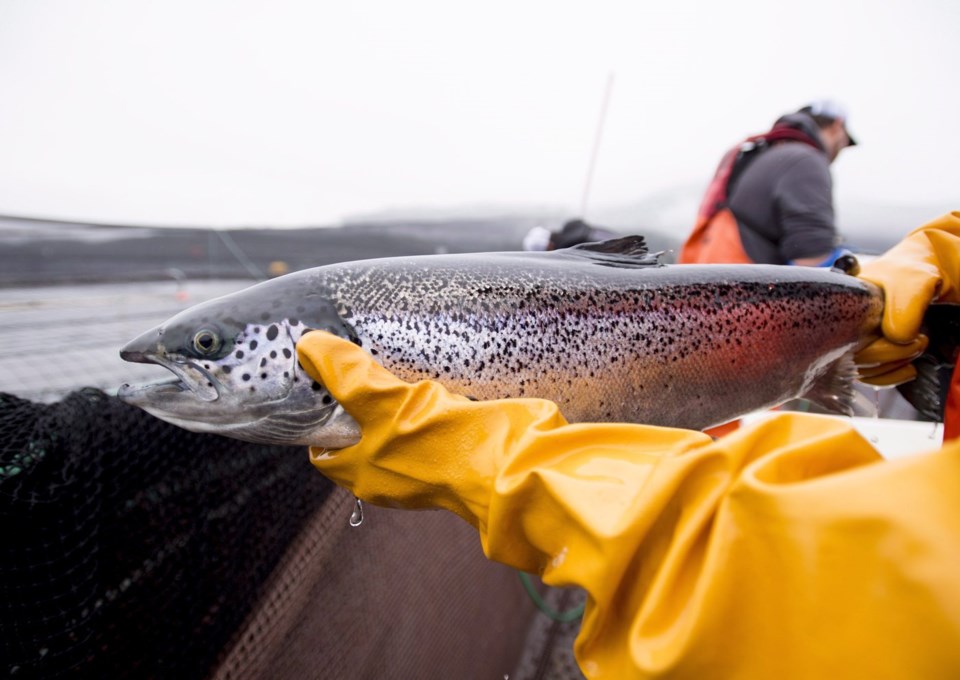VANCOUVER — With entrenched views on all sides of the salmon-farming debate in British Columbia, the federal government cast the issue five years down the road on Wednesday, saying aquaculture must move to land by 2029.
The government had promised to phase out the farms by next year, but Fisheries Minister Diane Lebouthillier announced she would allow aquaculture farms to renew their licences in a "responsible, realistic and achievable transition" away from the ocean farms.
Conservation and some Indigenous groups that have been lobbying Ottawa to make good on the 2019 commitment to phase out open net-pen salmon farms by 2025, said they were pleased with the decision to force the operations on land, but expressed concern with the extended time frame.
Industry representatives and СŔ¶ĘÓƵ Indigenous nations involved in salmon farming reacted with concern and disappointment, saying the government has created an environment of uncertainty that could cause economic harm to coastal and Indigenous communities.
"I will expect that the salmon farming industry will probably react negatively, but my message to them is engage us," Jonathan Wilkinson, the federal energy and natural resources minister, said in an interview.
"Engage us in a conversation about how we can actually make closed containment systems cost effective," said Wilkinson, a former minister of fisheries.
Lebouthillier has been consulting with many groups about the transition plan involving 79 salmon farms off the СŔ¶ĘÓƵ coast after Prime Minister Justin Trudeau pledged during the 2019 election that his government would phase out open ocean-pen farming.
The government said part of its aquaculture future program will include the introduction of nine-year licences for closed containment salmon farm operations, either marine- or land-based.
Wilkinson said the government is sending the message that it must move to protect declining wild salmon stocks, particularly in times when scientific debate is examining the possible impact of the farms on wild salmon.
"I'm not a scientist but I recognize the significance of the scientific debate, and in an era where these stocks are crashing, it behooves us to act with caution and not to wait until we actually don't have anything left to save," said Wilkinson, who announced the government's decision in 2019 to phase out the ocean-based salmon farms.
Indigenous leaders and industry representatives reacted with disappointment on Wednesday, saying the government is making a decision rooted in politics and not science.
"Instead of embracing a balanced pathway towards economic opportunity, increasing healthy and affordable homegrown food, recognizing an exceptional level of Indigenous collaboration and economic reconciliation and incrementally greater environmental protection, it has embraced a position that reflects unaccountable and extreme activist voices," Timothy Kennedy, Canadian Aquaculture Industry Alliance president, said in a statement.
The federal minister called the government's plan realistic, reasonable and achievable, but it really is "unrealistic, unreasonable and unachievable," he said.
The СŔ¶ĘÓƵ Salmon Farmers Association, which says the industry supports about 4,700 jobs and generates more than $1 billion annually, said the five-year transition plan will hurt coastal communities.
"Salmon farming in СŔ¶ĘÓƵ has been a vital sector contributing significantly to Canada's economy and food security,” Brian Kingzett, СŔ¶ĘÓƵ Salmon Farmers Association executive director, said in a statement. "However, the political conditions on the licences increase the uncertainty for aquaculture in СŔ¶ĘÓƵ and Canada."
Isaiah Robinson, deputy chief of the Kitasoo Xai'xais Nation on СŔ¶ĘÓƵ's Central Coast, said Ottawa is making a decision about the livelihoods of his people "based off of wealthy billionaires, politicians and activists."
Robinson made the comments at a Vancouver news conference with the leaders of several Indigenous nations who are involved in salmon farming.
"They're attempting to once again dictate our future as Indigenous people," he said.
The plan to remove open net-pen salmon farms from СŔ¶ĘÓƵ coastal waters is supported by most First Nations in the province, said Bob Chamberlin, who represents more than 100 СŔ¶ĘÓƵ nations as the First Nations Wild Salmon Alliance chairman.
"It benefits all British Columbians and so this is a very important day for wild salmon, but I think it's a big day for reconciliation across the province," he said at a news conference.
The Watershed Watch Salmon Society said it was pleased to hear the federal government will remove salmon farms from ocean waters, but has concerns about the five-year wait.
"We are relieved that the federal government is sticking to their commitment to remove the farms, but five years is too long for the phaseout period," executive director Aaron Hill said in a statement. "That’s five more years of bombarding wild salmon with parasites and viruses from factory fish farms."
Lebouthtillier said while wild Pacific salmon are an iconic species important to First Nations, and commercial and recreational fishermen, aquaculture represents food security and its supply to consumers is surpassing wild fishing around the world.
"If we want to protect wild species, want to move forward, we have to use aquaculture," she said.
Lebouthtillier said the future involves safely increasing aquaculture without harming wild salmon.
Former fisheries minister Joyce Murray, who attended Wednesday's news conference in Vancouver with Wilkinson, said salmon farming can amplify and release parasites and alien diseases into ocean waters infecting wild Pacific salmon on their migration routes.
"This transition is an opportunity to build sustainable economic alternatives with affected communities and to support our government's critical work and rebuilding vital salmon stocks and fisheries throughout," she said.
This report by The Canadian Press was first published June 19, 2024.
The Canadian Press




